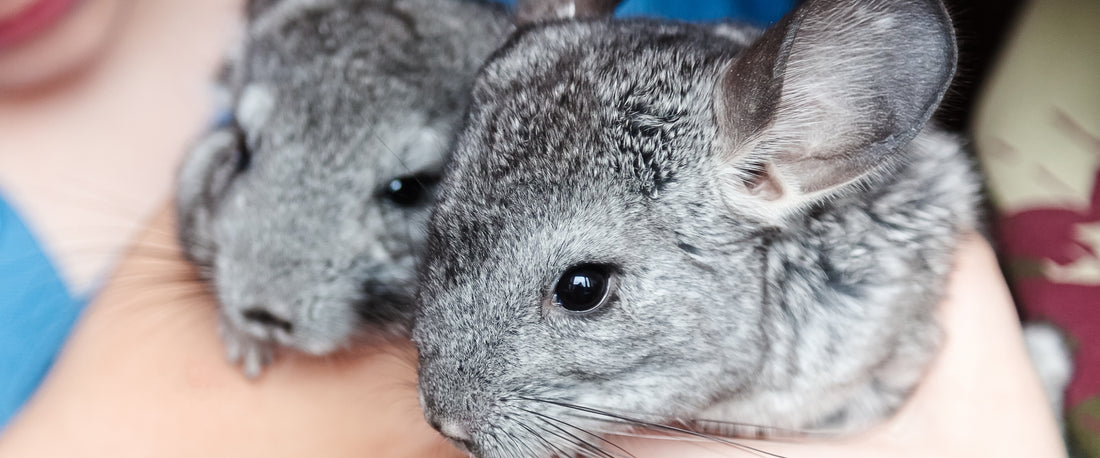
Food plays a really important part in your chinchilla's health and wellbeing. You should feed your chinchilla’s a diet that is as healthy as possible to help avoid unnecessary visits to the vets and help them live long and healthy lives.
The wrong diet can lead to all sorts of health problems, including dental problems, constipation and diarrhoea. Chinchilla’s are herbivores, so the best kind of diet for your chinchillas is as natural as possible, packed with plenty of fresh vegetables and hay to help with their digestive systems.
Over 85% of a chinchilla’s diet should be high quality, dust extracted feeding hay or fresh grass.
We’ve got some great tips on what the best hay for chinchillas is, and why feeding your chinchilla quality hay should make up the majority of your furry friend's diet for keeping your chinchilla healthy in our chinchilla feeding guide.
Read on to discover the best ways for keeping your chinchilla healthy through their diet.
The ideal diet for your chinchillas
Chinchillas are herbivores, evolved to eat a high fibre, low energy diet. They have very sensitive digestive systems, so feeding a good quality diet that is full of fibre is essential for their gut and dental health. Having enough hay is important for all small herbivores because it helps prevent obesity, dental disease, and maintains a healthy gut function.

Quality hay and grass foods should form 85-90% of your Chinchilla’s diet. Hay should be the biggest component of your chinchilla’s diet, since these furry friends require a high fibre diet which can be provided simply through eating just good quality feeding hay. Timothy hay is the most popular type of hay for pet chinchillas due to its digestive health benefits and for helping to prevent dental problems.

How can hay and grass help prevent dental problems?
Premium hay and grass is the best food to feed your chinchillas to prevent dental disease or any teeth related problems that these small pets can suffer from. Timothy hay is the best chinchilla food since this is a coarse variety of hay containing high levels of beneficial fibre, which helps to wear down teeth.
Not only is Timothy hay great for preventing boredom and dental problems due to it taking a long time to eat, but chewing and gnawing is a really important natural behaviour for your chinchilla and for maintaining a healthy digestive system.
Like other rodents, it is important to remember that your chinchilla has teeth that grow continuously throughout their life, and overgrown teeth can cause potentially fatal problems.
Ideally, chinchillas teeth wear down from chewing and new teeth push through the gums. If your furry friend isn’t able to wear down their teeth properly through the right diet, then serious dental problems can occur. You can help prevent this by providing the right feed and chewing material for your pet.
Providing wood blocks or other suitable chewing material for your chinchilla to nibble on is great for wearing down teeth. Chinchillas can gnaw on untreated softwood including apple and dogwood, but before giving them any softwood branches to chew on, cut them into bite-size twigs of around 4-5”, clean them with running water and a toothbrush to remove any dirt or sap and dry off with a towel.
Some people like to boil their twigs to sanitise them fully too. You can then bake them on a baking tray for upto an hour to dry them out completely and to kill off any micro-organisms. Oven temperature depends on the thickness of the wood, so between 170-250 degrees should do it. Although some chinchillas like slightly toasted wood - keep your eye on the oven to make sure they don’t burn. You will know the treats are ready if they snap when you bend them, if not, they need a little longer in the oven.
Allow to cool then store your chin-treats in a cool, dry place inside a cardboard box, paper bag or container with holes in - airflow is important to ensure they don’t go mouldy.
Whether you choose to boil, and/or bake, always wash them to make sure they’re safe before giving these twiggy treats to your chinchilla.
If you are unsure what type of woods are safe for your chinchilla to chew on, please get advice from your vet before giving them anything to gnaw on in their cage.
What problems can obesity cause in chinchillas?
Obesity is a common problem in many species of pet animals, with the primary cause being overfeeding of improper diets excessively high in calories and not enough exercise. Chinchillas are prone to becoming overweight, which is often due to being overfed and a lack of exercise. It is important to avoid treats that are high in sugar like fruit.
Encourage your chinchillas to forage rather than sit and overeat from their bowl. A great way to bring out their natural foraging instincts and stay fit is by hiding healthy treats around their cage. Sudden weight loss can be a sign of a serious illness like dental disease or stress. If you have any worries about your chinchilla’s weight or eating habits, please contact your vet immediately.
How much to feed a chinchilla
Grazing herbivores such as rabbits, guinea pigs, and chinchillas do best with very high fibre and low-calorie food in their diets. This is why at least 85% of your chinchilla’s diet should be mostly grass hay like Timothy since this is the most nutritionally rich type of hay that is low in sugar.
Your chinchillas should be offered a small amount (1-2 tablespoons per chinchilla) of grass-based chinchilla pellets in addition to hay with small amounts of fresh vegetables
Chinchillas can be fed fresh greens to give additional fresh nutrients and to provide some variety to their diet. However, be careful about what you feed them and how much, since your furry friends should only be having around a teaspoon each day.
Muesli-stye foods can be a real problem for chinchillas
Muesli-style foods should try to be avoided when considering a chinchilla's diet. It is well known that chinchillas can become fussy eaters and will eat sweet foods as an easy way to get a glucose fix.
As a result, they can pick out the unhealthy parts of muesli-style foods, leaving the healthier bits behind. Feeding your chinchilla this type of food instantly leads to an imbalanced diet lacking in calcium, phosphorus and vitamin D.
By not feeding your chinchilla a healthy balanced diet with the right kind of fibre from hay and grass it can lead to illness or even death of your chinchilla.
Common health problems for chinchillas from a poor diet
Alongside a bad diet leading to dental problems, if chinchillas are lacking fibre this can lead to your chinchillas becoming constipated or having diarrhoea.
If your chinchilla is constipated, they might look bloated with fewer droppings than normal. This tends to be caused by stress, pain or a lack of fibre and water, so access to plenty of fresh drinking water and hay is vital for a healthy gut function.
Diarrhoea is another common problem with chinchillas who are normally overeating, especially with too many treats or vegetables. Other causes might be due to stress, lack of fibre, or a reaction to some bad food. Try to avoid feeding your chinchilla any special treats if they have diarrhoea.
What is the ideal home for chinchillas?
In the wild, chinchillas are hunted by other animals. This is why naturally they like to hide in places so they feel safe and secure, because if chinchillas don’t have access to a safe place they can start to become very stressed which can affect their eating habits.
A nest box lined with clean, dry bedding from hay and shredded paper can make a great place to hide and get some rest. Any bedding used should be dust-free, but don’t ever use shredded newspaper because the ink can be toxic for small pets like chinchillas. Always remember to give them a plentiful supply of fresh, clean water in their cage at all times.
Find out more about how Newhay grows highly nutritional and tasty hay ideal for small animals.

